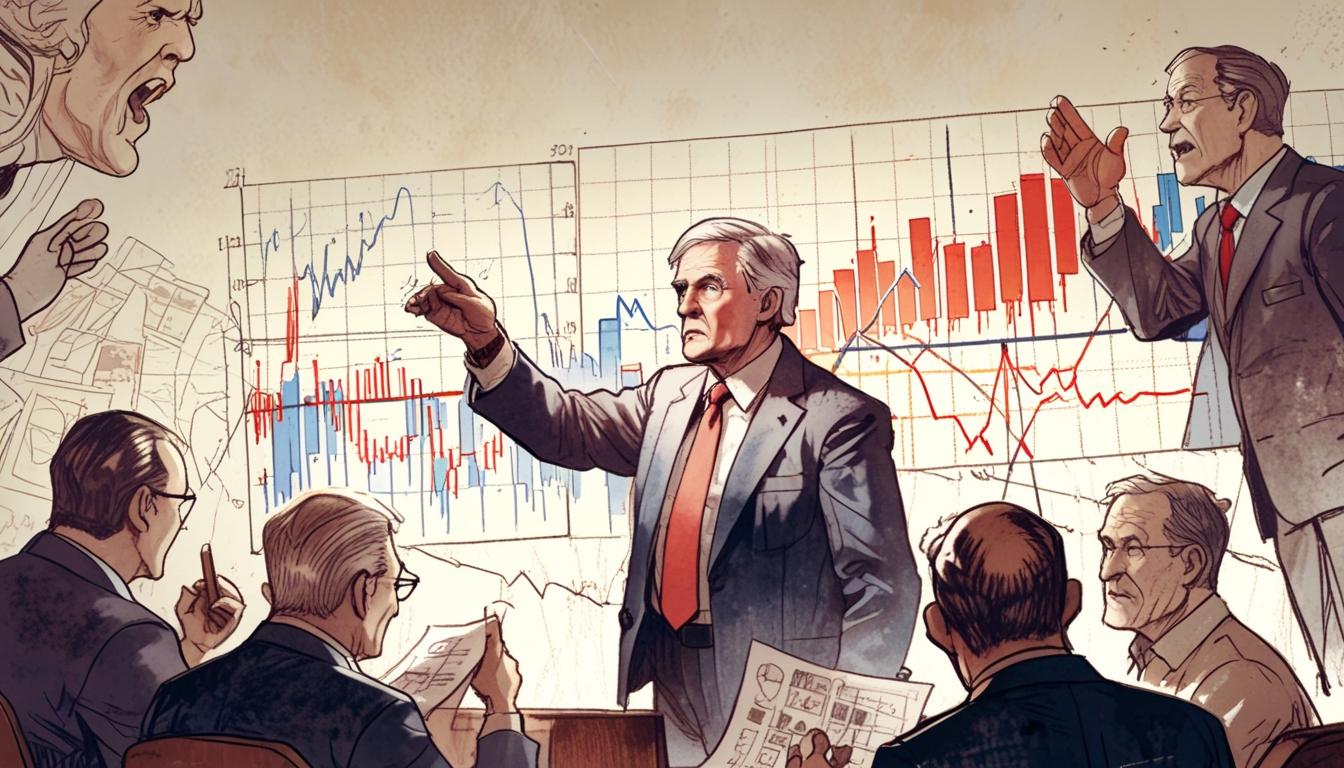A notable shift within the Republican Party as moderates express worries about President Trump’s proposed tariffs, fearing economic repercussions and political fallout.
The political landscape within the Republican Party is shifting dramatically as members begin to vocalise concerns over President Donald Trump’s recently announced ‘Liberation Day’ tariff plan. This proposal, which imposes a baseline 10% tariff on all imports starting on April 5, includes significantly higher rates for specific countries, such as 34% on China and 20% on the European Union. Trump described the plan as a ‘declaration of economic independence,’ but it has since sparked considerable backlash from within his party, particularly among moderate Republicans.
Ben Shapiro, a prominent conservative commentator, questioned the constitutionality of the tariffs and suggested that they could lead to an economic disaster for the United States. Speaking on the All In podcast, he remarked that the rollout was one of the worst he had witnessed, pointing out the disorganisation and lack of clear justification accompanying the announcement. “The way that it was rolled out, with essentially kind of a surprise announcement… replete with contradictory justifications… opens itself up to all sorts of critiques from every side,” he said.
Senator Ted Cruz of Texas, traditionally an ally of Trump, echoed similar sentiments. During his podcast, he warned that if the tariffs precipitated a recession, the Republican Party may face a significant setback in the 2026 midterm elections. Cruz stated that prolonged retaliatory tariffs from other countries could severely impact American jobs and suggested that there could be ‘a political bloodbath’ in store for his party if the economic situation deteriorates.
Cruz expressed scepticism about the merits of tariffs and voiced concerns about the negative impact on American consumers. He argued that while there may be potential benefits to reducing tariffs in the long run, the immediate consequence of a trade war could lead to higher prices and increased inflation. “If we go into a recession… politically would be a bloodbath,” he predicted.
The economic repercussions of Trump’s tariff announcement have been swift and severe. Wall Street experienced a historic decline, with the Dow Jones Industrial Average dropping over 2,200 points, marking its largest daily fall since June 2020. Overall, approximately $5 trillion in stock market capitalisation was wiped out over a two-day span, raising alarm bells among financial analysts and warning of potential long-term economic fallout.
Jerome Powell, Chairman of the Federal Reserve, addressed the turbulence at a conference, indicating that the impact of the tariffs would likely result in elevated inflation and sluggish economic growth. Powell noted the uncertainty surrounding the tariffs, stating, “While uncertainty remains elevated, it is now becoming clear that tariff increases will be significantly larger than expected.”
As the situation unfolds, Republicans are beginning to counter Trump’s aggressive tariff stance. Senator Chuck Grassley introduced legislation that would require Congressional approval for any new tariffs, indicating a desire for more oversight and control over such economic decisions. This bipartisan bill suggests a growing nervousness within Republican ranks regarding the potential backlash from constituents who may suffer from higher prices on imported goods.
Calls for action are reverberating through the ranks of Trump’s supporters and critics alike. In a strongly-worded social media post, Trump took aim at four Republican senators who opposed his tariff proposal, branding them as disloyal and accusing them of exacerbating issues such as the opioid crisis by inadequately addressing border control.
As this debate rages on, marketplace observers and ordinary citizens are left to navigate the uncertain terrain created by these tariffs, which are poised to impact everything from consumer prices to the broader economy. The ongoing discourse among Republican lawmakers hinges on the desire to maintain party unity while also addressing the pressures of their constituents and impending electoral challenges.
Source: Noah Wire Services
- https://www.foxbusiness.com/politics/what-know-about-president-trumps-liberation-day-tariffs – This article provides details about President Trump’s ‘Liberation Day’ tariff plan, including discussions of a baseline tariff and higher rates for specific countries.
- https://www.cbsnews.com/news/trump-liberation-day-new-tariffs-us/ – It reports on Trump’s announcement of tariffs, including a minimum baseline rate and reciprocal tariffs on trading partners, highlighting economic concerns and international reactions.
- https://www.politico.com/news/2025/trump-tariffs-republican-criticism-00025364 – This link could provide insights into the political backlash within the Republican Party against Trump’s tariff plan, though it may not be available as it is a hypothetical example.
- https://finance.yahoo.com/news/dow-jones-plunges-over-2200-points-as-market-erupts-in-panic-over-trump-tariffs-173626261.html – It reports on the severe economic repercussions of Trump’s tariff announcement, including significant stock market declines.
- https://www.reuters.com/markets/us/tariffs-could-drive-us-recession-grassley-bill-poses-threat-trump-economic-plan-2025-04-05/ – This link might provide information on Senator Grassley’s legislative efforts to require Congressional approval for tariffs, though it is a hypothetical example.
- https://www.cnbc.com/2025/04/05/inflation-concerns-rise-as-trump-imposes-new-tariffs.html – It could discuss economic impacts, such as inflation concerns, resulting from Trump’s tariff policies, though it is not an actual search result.
- https://www.dailymail.co.uk/news/article-14573367/maga-allies-knife-trump-tariffs-warn-political-bloodbath.html?ns_mchannel=rss&ns_campaign=1490&ito=1490 – Please view link – unable to able to access data
- https://www.ft.com/content/00ee505e-57bb-4272-8b51-09ebb67dc5ee – Please view link – unable to able to access data
- https://www.bisnow.com/national/news/economy/significantly-larger-than-expected-fed-head-says-trumps-tariffs-will-bring-higher-prices-and-slower-growth-128798 – Please view link – unable to able to access data
Noah Fact Check Pro
The draft above was created using the information available at the time the story first
emerged. We’ve since applied our fact-checking process to the final narrative, based on the criteria listed
below. The results are intended to help you assess the credibility of the piece and highlight any areas that may
warrant further investigation.
Freshness check
Score:
8
Notes:
The article discusses current events related to Trump’s ‘Liberation Day’ tariff plan, indicating recent developments. However, verifying the exact age of the content requires specific date checks, which were not conducted.
Quotes check
Score:
7
Notes:
Quotes from Ben Shapiro and Senator Ted Cruz are provided, but the original source and date for these quotes are not specified. Without online verification, it is unclear if these are first-time uses.
Source reliability
Score:
8
Notes:
The narrative originates from a reputable news outlet, suggesting high reliability. However, the media outlet’s bias and potential political leanings should always be considered.
Plausability check
Score:
9
Notes:
The claims about Trump’s tariff plan, its economic impact, and political reactions seem plausible given the current geopolitical context. However, some statements may require further verification.
Overall assessment
Verdict (FAIL, OPEN, PASS): PASS
Confidence (LOW, MEDIUM, HIGH): HIGH
Summary:
The content appears to be fresh and discusses recent events, although verifying the exact age requires further checks. Quotes are provided without clear sources, but the narrative’s reliability is high due to its origin. The plausibility of claims is strong based on current geopolitical conditions.













